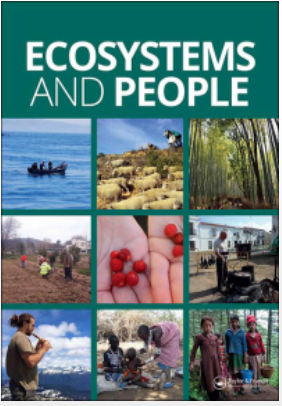Combining Ecological Niche Models and ecosystem services indicators to assess impacts of climate change on kelp: application to French coasts
IF 3.7
Q1 Agricultural and Biological Sciences
引用次数: 0
Abstract
ABSTRACT Kelp forests, primarily Laminaria digitata, provide a broad range of ecosystem services of high social, economic, and ecological value and are considered one of the most productive ecosystems on the planet. Several studies have shown that kelp ecosystems are regressing in response to multiple stressors, especially climate change, which could lead to local extinctions. This may induce a decrease in the ecosystem services provided. Many studies use ecological niche models (ENM) to project potential future species distributions under climate change scenarios; however, no study has projected the future supply of ecosystem services resulting from shifts in species ranges and changes in biomass. In this study, using French coasts as a case study, we developed a new and reproducible methodological framework that combines ENM and ecosystem services indicators to assess impacts of climate change on ecosystem services supplied by kelp. To this end, we first identified ecosystem services currently provided by kelp and then used ENM to project future kelp distribution from 2041 to 2050 under climate scenarios RCP2.6 and RCP8.5. Finally, by estimating the biomass of kelp, we assessed the current and future ecosystem services provided by kelp.结合生态位模型和生态系统服务指标评估气候变化对海带的影响:在法国海岸的应用
海带森林,主要是海带,提供广泛的生态系统服务,具有很高的社会、经济和生态价值,被认为是地球上最具生产力的生态系统之一。几项研究表明,海带生态系统在多种压力因素的影响下正在退化,尤其是气候变化,这可能导致当地物种灭绝。这可能导致所提供的生态系统服务减少。许多研究使用生态位模型(ENM)来预测气候变化情景下潜在的物种未来分布;然而,没有研究预测了物种范围变化和生物量变化导致的未来生态系统服务供应。在这项研究中,我们以法国海岸为例,开发了一个新的、可重复的方法框架,将ENM和生态系统服务指标结合起来,评估气候变化对海带提供的生态系统服务的影响。为此,我们首先确定了海带目前提供的生态系统服务,然后利用ENM预测了在RCP2.6和RCP8.5气候情景下2041 - 2050年海带的未来分布。最后,通过估算海带生物量,对当前和未来海带提供的生态系统服务进行了评估。
本文章由计算机程序翻译,如有差异,请以英文原文为准。
求助全文
约1分钟内获得全文
求助全文
来源期刊

Ecosystems and People
Agricultural and Biological Sciences-Ecology, Evolution, Behavior and Systematics
CiteScore
7.80
自引率
11.30%
发文量
40
审稿时长
42 weeks
期刊介绍:
Ecosystems and People is an interdisciplinary journal that addresses how biodiversity and ecosystems underpin human quality of life, and how societal activities and preferences drive changes in ecosystems. Research published in Ecosystems and People addresses human-nature relationships and social-ecological systems in a broad sense. This embraces research on biodiversity, ecosystem services, their contributions to quality of life, implications for equity and justice, and the diverse and rich ways in which people relate to nature.
 求助内容:
求助内容: 应助结果提醒方式:
应助结果提醒方式:


